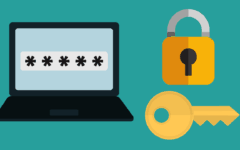In our last article, we went over some of the different types of Internet security threats that are out there, and some of the horrible stuff that they can do. However, that information is by no means meant to make you afraid of the Internet; in fact, avoiding many of these types of Internet threats is actually a lot easier than you may think. Remember that most cyber-criminals rely on automated computer programs to do their dirty work for them, and these programs can't think for themselves (at least, as far as we know). So, as long as you know how a malicious program behaves — with the most important aspect being how it makes it onto your computer in the first place — you can safely work around it while using the Internet.
6 Internet safety tips to stay safe online
Here are some general precautions that you can take to make your Internet experience fun instead of frightful. We'll be going into more detail with many of them in later tutorials.
1. Find and use a trusted piece or suite of antivirus software.
Most viruses and malicious programs that can't be dodged with the rest of the precautions below are relatively minor ones that can be dealt with by antivirus software. This is a program or set of programs that you can install on your computer to detect and outright block many viruses and other malicious programs that try to enter your computer from the Internet. Many of these programs also have measures for isolating viruses that do happen to make it onto your computer so that they can't do damage, and then you can either delete them or find a way to fix the infected file(s) from there.
NOTE: This is an absolute must-know tip for Windows users, since most viruses are designed to attack Windows-capable computers. However, it's also good to know for Apple users, since there are some viruses that can attack Apple computers as well.
2. Use your passwords wisely.
Many of your accounts on the Internet (and some programs or systems on your computer) require a password — and perhaps other user credentials — in order to access them. Passwords are an essential line of defense against identity thieves on the Internet, so it's important to know how to use them properly. Create passwords that are easy for you to remember, but would be difficult for others to guess, and try not to use the same password for every account. Change your passwords periodically (say, every 3 to 6 months), and reset them if you think someone is using one of your accounts who shouldn't be. Write down your passwords so that you'll remember them, but put them in a place where only you can get at them. Or, consider using a password manager program to help keep your different passwords in order.
We'll have an entire course on how to use passwords effectively in the future, so stay tuned!
3. If a website or email looks fishy, delete it or otherwise get away from it.
We explained that certain types of Internet dangers — such as Trojan horses or phishing scams — are designed to trick victims into doing something dangerous that they otherwise wouldn't. However, many of them aren't all that clever or convincing, if you look closely at them. There are often dead giveaways that you can look for to know that you're dealing with a phony website or email, such as advertising that seems too good to be true, numerous spelling and grammar mistakes, weird-looking or misspelt email sender addresses or web addresses, or direct requests over email for personal information or money (most legitimate businesses will never do this).
If you run into a website like this, get out of it as soon as you can, and don't click any links on it. Similarly, if you get an email like this, delete it as soon as you can; don't click any links in it, and definitely don't open any attachments on it.
4. Control how much personal information you put on the Internet.
Cyber-criminals can't steal your identity or financial information over the Internet if you don't put it there for them to find in the first place. Doubtless, though, there will be some websites where you are required to input personal information, such as if you are buying or selling things. Use the guidelines in tip #3 to only give your personal information to websites that can be trusted to keep it secure.
Things get a little bit murkier when it comes to social networks and websites. You want to express yourself and let other people get to know you, but putting information onto a place like Facebook or Twitter makes it easy to find and/or spread. Fortunately, many of these websites have privacy features that you can use to limit who can see information that you post. However, before you share information in the first place, it's a good idea to ask yourself if you'd be willing to let a total stranger — or at least a friend of a friend — see it and share it.
5. Only make payments on trusted websites.
Following tips #3 and #4, if you're going to use trusted e-commerce websites to buy goods and services, make sure to pay for your stuff through the specific website that you're using at the time, if you can. This ensures that a trusted website has a record of your transaction, and can help you out if something goes wrong.
Some third-party sellers attempt to have customers make payments for items outside of the websites that they sell them on. Not only do many e-commerce websites disallow this (because it cheats them out of commission fees), but even if a site does allow it, you probably shouldn't go for it. It's a very easy way to get scammed, since nobody with the proper authority will have a paper trail to help you track down and punish the scammer.
6. Log out of websites and other Internet-based programs when you're done using them.
This is a really important precaution if you use public computers, but it's not a bad idea in general. If you're using a website where you have to log into a user account, be sure to log out of your account once you're finished using the website. Also, disable any features of that website that allow you to stay logged in if you close your web browser or don't do anything while logged in for a little while. Forgetting that you're logged into a website or Internet-based program could mean that a stranger could sit down at the computer you were using, and find that they're able to access your account without even cracking your user name or password. That's a very easy way to have your confidential information stolen.
Again, we'll be going over many of these precautions in greater depth in our upcoming tutorials and courses. In fact, our next set of tutorials in this course deal with our very first precaution: antivirus software!






